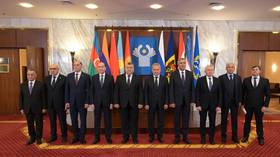NATO rival warns of new ‘nuclear arms race’

A decision to deploy long-range missiles in Western Europe could trigger a new nuclear arms race, Collective Security Treaty Organization (CSTO) Secretary-General Imangali Tasmagambetov has warned.
The CSTO is a military alliance in Eurasia founded in 1992 following the breakup of the Soviet Union. The current members include Russia, Belarus, Kazakhstan, Kyrgyzstan, Tajikistan, and Armenia.
The remarks, made by the secretary-general at the 12th meeting of the CIS Security Council Secretaries on Thursday, referred to the announcement by Washington and Berlin that the weapons could arrive in Germany as early as 2026.
“The American-German decision to deploy longer-range weapons in Western Europe has created a threat of resuming the nuclear missile arms race on the continent and in the world in general,” Tasmagambetov said.
In July, the US and Germany issued a joint statement indicating that Washington would begin “episodic deployments” of long-range missiles in Germany in 2026, as part of planning for the continual “stationing of these capabilities in the future.”
The systems will include SM-6 and Tomahawk missiles with ranges of up to 460km and 2,400km, respectively, as well as developmental hypersonic weapons, according to Washington. The assets have a “significantly longer range than current land-based fires in Europe,” the statement noted.
Stationing these systems in Europe was banned under the 1987 Intermediate Range Nuclear Forces (INF) Treaty, but the US unilaterally withdrew from it in 2019.
In response, Moscow said it would keep all options on the table, including reserving the right to reposition missiles with nuclear warheads if the US goes ahead with its deployment.
Russian President Vladimir Putin warned in August that if the US implements its plans, “we will consider ourselves free from the previously adopted moratorium on the deployment of medium- and short-range strike weapons… [and] take mirror measures.”
Putin said that the US deployment would put multiple key Russian state and military facilities within reach of the missiles, with the flight time being about ten minutes.













